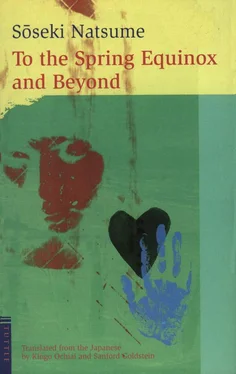Natsume Soseki - To the Spring Equinox and Beyond
Здесь есть возможность читать онлайн «Natsume Soseki - To the Spring Equinox and Beyond» весь текст электронной книги совершенно бесплатно (целиком полную версию без сокращений). В некоторых случаях можно слушать аудио, скачать через торрент в формате fb2 и присутствует краткое содержание. Год выпуска: 2006, Издательство: Tuttle Publishing, Жанр: Классическая проза, на английском языке. Описание произведения, (предисловие) а так же отзывы посетителей доступны на портале библиотеки ЛибКат.
- Название:To the Spring Equinox and Beyond
- Автор:
- Издательство:Tuttle Publishing
- Жанр:
- Год:2006
- ISBN:нет данных
- Рейтинг книги:5 / 5. Голосов: 1
-
Избранное:Добавить в избранное
- Отзывы:
-
Ваша оценка:
- 100
- 1
- 2
- 3
- 4
- 5
To the Spring Equinox and Beyond: краткое содержание, описание и аннотация
Предлагаем к чтению аннотацию, описание, краткое содержание или предисловие (зависит от того, что написал сам автор книги «To the Spring Equinox and Beyond»). Если вы не нашли необходимую информацию о книге — напишите в комментариях, мы постараемся отыскать её.
To the Spring Equinox and Beyond — читать онлайн бесплатно полную книгу (весь текст) целиком
Ниже представлен текст книги, разбитый по страницам. Система сохранения места последней прочитанной страницы, позволяет с удобством читать онлайн бесплатно книгу «To the Spring Equinox and Beyond», без необходимости каждый раз заново искать на чём Вы остановились. Поставьте закладку, и сможете в любой момент перейти на страницу, на которой закончили чтение.
Интервал:
Закладка:
Slightly recovering his courage, Keitaro seized the opportunity to give his name and the purpose of his visit.
"Oh, oh, I see," said the older man as if just remembering. "Ichizo told me over the phone only a while ago. But I wasn't expecting you tonight."
Keitaro saw in these words the implication that he should not have come this soon, so he had to give the best explanation he could.
The man stood there in such a way that it couldn't be told whether he was listening or not. "Come again then," he said. "I'll be leaving on my trip in four or five days. If I find time to see you before I leave, I've got no objection."
Keitaro offered some courteous words and left through the gate. In the darkness he felt his thanks had been a little too polite.
As he learned much later from Sunaga, the master of the house had on that night been sitting alone at a go board in a Western-style drawing room adjacent to the entrance and had been alternately putting down white and black stones, immersed in one of the strategies of the game. He had been trying to solve a problem after having played go with a guest. Just at a vital point he had been interrupted by Keitaro's clamor at the door and felt as though he were being disturbed by some country bumpkin. His irritation had made him go out to the hall himself to get rid of the intruder in order to concentrate on the go problem. When Keitaro heard these details from Sunaga, he felt that his politeness toward Taguchi had been all the more excessive.

Two days later Keitaro phoned Taguchi and asked outspokenly if the time were appropriate for a visit. The party that answered seemed to have regarded Keitaro's language and manner as rather arrogant and consequently those of a man of considerable position.
"Please wait a moment, sir," the courteous voice said. "Let me ask if your visit is convenient, sir. I will soon bring a reply." But when he returned with the answer, his manner of speech had changed considerably: "You still there? Right now we've got a visitor, so we can't see you. If you want, you can drop in at one in the afternoon."
"Fine, I'll come around one. Remember me to your master." Keitaro put down the phone in disgust.
He had ordered the maid to bring lunch at noon sharp, but it had not come at the appointed hour. As if urged on by the noisy bell from the university tower, he told her to hurry it in, and he finished as quickly as he could.
On the streetcar Keitaro recalled Taguchi's attitude toward him two nights ago. This time too would he be treated in the same rough off-handed manner? Or would he be given a more favorable reception, since the other party had consented to see him? He was prepared to stoop a little, even to put up with being made to feel awkward, as long as he could obtain a good position through the gentleman's kind offices. But he had been offended by the servant who had received his telephone call and who, in less than five minutes, had changed his manner of speech for the worse. He hoped the impertinent boy would not greet him at the door. His frame of mind was such that while he had been insulted by the servant's manner, he was himself unaware that he himself had spoken over the phone somewhat too arrogantly for a person of his status.
At the corner of Ogawamachi, a glimpse from the streetcar to the side street leading to Sunaga's reminded him suddenly of the woman's figure he had seen from behind, and his imagination emerged all at once from shadow to sunshine. It was far more exhilarating to tell himself that he was on his way to the place where Sunaga's pretty cousin lived than to be conscious that he was out to beg some means of livelihood from an old man who, for all the pains he was being put to, would certainly not present a smiling face to him. He had decided, quite arbitrarily, that old Taguchi and Sunaga's cousin had to be father and daughter. Yet the two were decidedly separate in his mind. The other night when he had stood face to face with Taguchi at the entrance to his house, the light had made it difficult to discern the other's features, but as far as he had judged from the contour of Taguchi's face, it was not dignified. That first impression of the older man, even if seen only at night, was indisputably registered in his mind. Yet in spite of this impression, it had never occurred to him that the man's daughter, whatever her relationship to Sunaga, was not good-looking. The idea he had of the Taguchis, therefore, was like a double-sided picture, as it were, light in front, dark in back, each side seeming to be simultaneously separate and yet united into one sheet.
Having turned the picture this way and that, Keitaro found himself standing before Taguchi's gate. The sight of an automobile parked there with a chauffeur inside gave him a slightly uneasy feeling.
He went up to the entrance and handed his card to a young houseboy in a duck-cloth hakama. The houseboy told him to wait a moment and carried his calling card inside. Finding that the voice was certainly the same as the one he had heard on the phone, Keitaro, watching the retreating figure, thought him an obnoxious kid.
The boy returned with the card still in his hand. "Sorry," he said, standing in front of Keitaro, "but we have a visitor. Some other time, please."
Vexed, Keitaro said, "I inquired just before on the phone. I was told that you had a visitor then and that I should come around one in the afternoon."
"The visitor hasn't left yet. They're busy with lunch and so forth."
If listened to with composure, the excuse might have been regarded as not altogether implausible, but to Keitaro, who had already been aggravated with the boy since their telephone conversation, these words gave further offense. "Are they really?" he said, and then added, perhaps anticipating what the boy ought to have replied, "Sorry to have caused you so much trouble," concluding with, "Return my thanks for your master's kindness!"
With these inconsistent words as a parting shot, Keitaro whisked round the automobile at the gate as if to say, "Damn that car!"

After finishing the interview, Keitaro had planned to visit a friend who had recently married and settled in a new house in Tsukiji, talking with him till evening and offering an enjoyable account of the relations with Sunaga, Sunaga's cousin, and his uncle, all pieced together by the string of his imagination. When he left Taguchi's front gate and stood beside Hibiya Park, however, his mind was too full to carry out his plan. He found nothing to cheer him in having visited the home of the woman he had seen from behind, that woman whose whereabouts he had finally located. Even less was he aware of having gone there to find a job. The only thing that filled his mind was an annoyance resulting from feelings of humiliation. And he felt that Sunaga, who had introduced him to a man like Taguchi, should assume full responsibility for the treatment he had received. He thought of dropping in on Sunaga on the way home and, after recounting all that had happened, laying before him to his heart's content all these grievances.
He turned around and caught a streetcar straight to Ogawamachi. His watch indicated it was about twenty minutes to two. Arriving at Sunaga's house, he deliberately called his friend's name twice from the street, but whether he was in or out, the upstairs screens remained closed. The rather prim Sunaga, who had told him he hated being called in this boorish way, might have been ignoring Keitaro's shout even if it had reached him. So Keitaro went up to the lattice door at the entrance to make a formal call. When he heard the maid at the door say that Sunaga had gone out just after noon, he stood there disappointed, silent for a moment.
Читать дальшеИнтервал:
Закладка:
Похожие книги на «To the Spring Equinox and Beyond»
Представляем Вашему вниманию похожие книги на «To the Spring Equinox and Beyond» списком для выбора. Мы отобрали схожую по названию и смыслу литературу в надежде предоставить читателям больше вариантов отыскать новые, интересные, ещё непрочитанные произведения.
Обсуждение, отзывы о книге «To the Spring Equinox and Beyond» и просто собственные мнения читателей. Оставьте ваши комментарии, напишите, что Вы думаете о произведении, его смысле или главных героях. Укажите что конкретно понравилось, а что нет, и почему Вы так считаете.












